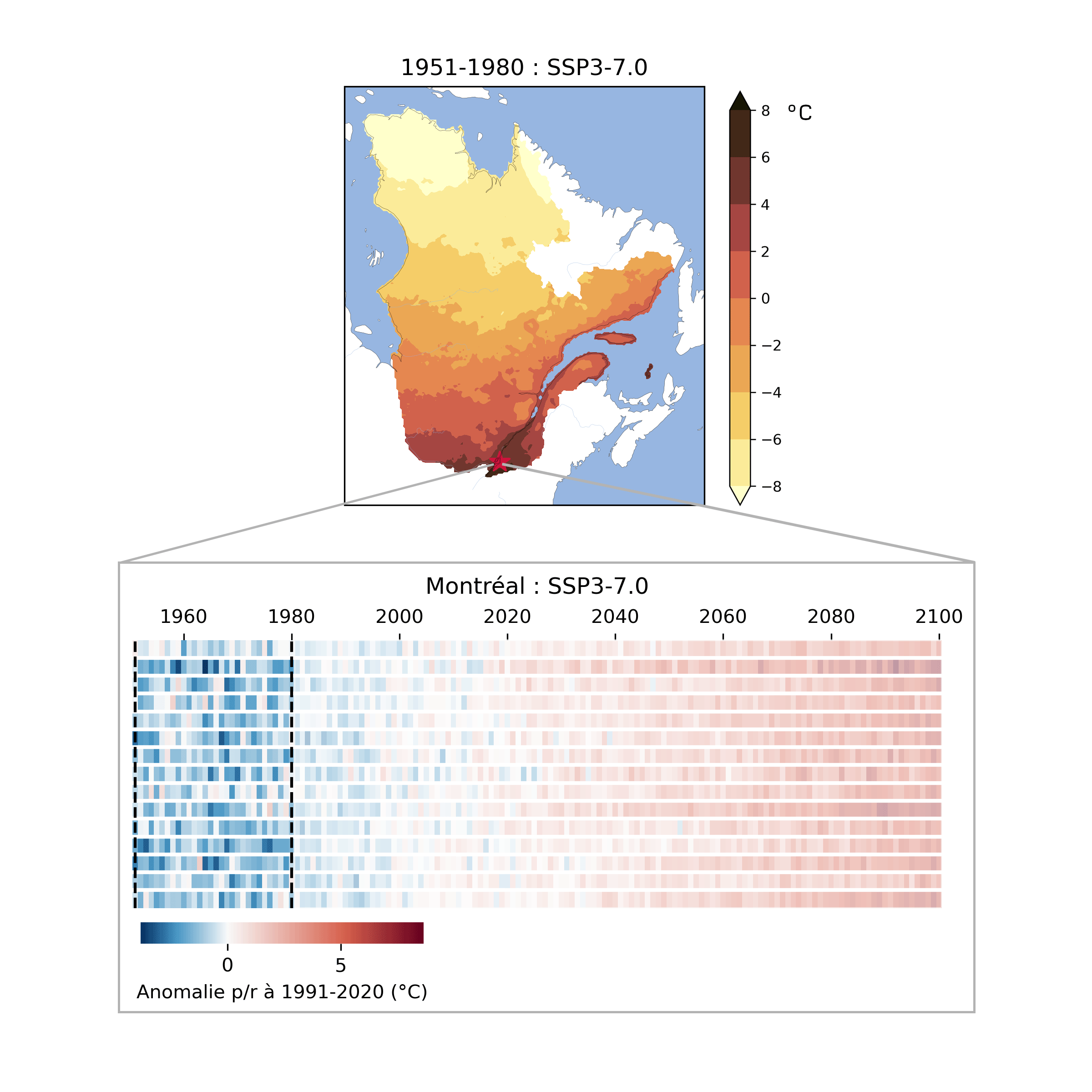ESPO-G6-R2 v1.0
Ouranos Ensemble of Bias-adjusted Simulations - Global models CMIP6 - CaSR v2.1
ESPO-G6-R2 v1.0 is an ensemble of multi-model climate simulations based on the Coupled Model Intercomparison Project (CMIP6). Trend preserving quantile post-processing is applied to this climate ensemble to reduce biases and statistically downscale global model outputs.
ESPO-G6-R2 v1.0 consists of daily timeseries at a spatial scale of 10X10 km for three variables: daily maximum temperature, daily minimum temperature and daily precipitation. Global climate model data are post-processed using Environment and Climate Change Canada’s Canadian Surface Reanalysis (CaSR v2.1) as a target. The ESPO-G6-R2 v1.0 ensemble is available from 1950 to 2100 over North America.
A related ensemble, ESPO-G6-E5L v1.0, is also available. Its features are identical to those described above, except that the ERA5-Land reanalysis has been used as the target for simulation post-processing.
Visit the Ouranos climate modeling page to find out more about the CMIP6 experiment, SSPs and climate modeling.

Figure 1. Evolution of mean temperature in Quebec from 1951 to 2100 as estimated with 15 ESPO-G6-R2 v1.0 climate simulations (see Table 1) for SSP3-7.0. Each image shows a 10-year average for each 10X10 km grid point. Source: Ouranos 2024.
Figure 2. Temperature anomalies in Montreal from 1950-2100 as estimated by each of the 15 selected individual ESPO-G6-R2 v1.0 simulations (see Table 1) based on SSP3-7.0. Each line represents post-processed data from one climate model, and each square shows the annual anomaly (or difference between one year's temperature and the 1991-2020 climate normal).
The dataset contains 76 climates simulations, driven by three scenarios of greenhouse gas concentration, aerosols and land use (26 for SSP2-4.5, 24 for SSP3-7.0 and 26 for SSP5-8.5). Ouranos recommends selecting simulation from this set to avoid problems arising from the high climate sensitivity of a large number on CMIP6 models (see Table 1). In addition, the use of SSP2-4.5 and SSP3-7.0 is prioritized for the majority of climate change risk and adaptation analyses. The Ouranos Recommendations Guide provides additional information to facilitate the use of climate projections in applied contexts.
Table 1. ESPO-G6-R2 v1.0 simulations whose climate sensitivity is considered likely by the IPCC (transient climate response -TCR- between 1.4 and 2.2°C). Simulations are identified by the Modeling Center, climate model acronym and member.
Modeling center | Acronym | Model | Member | TCR (°C) |
Institute for Numerical Mathematics | INM | INM-CM5-0 | r1i1p1f1 | 1.41 |
NorESM Climate modeling Consortium | NCC | NorESM2-LM | r1i1p1f1 | 1.49 |
Chinese Academy of Sciences | CAS | FGOALS-g3 | r1i1p1f1 | 1.50 |
Beijing Climate Center | BCC | BCC-CSM2-MR | r1i1p1f1 | 1.55 |
Japan Agency for Marine-Earth Science and Technology, Atmosphere and Ocean Research Institute (The University of Tokyo), et National Institute for Environmental Studies | JAMSTEC-AORI-NIES-R-CCS | MIROC-ES2L | r1i1p1f2 | 1.49 |
MIROC6 | r1i1p1f1 | 1.55 | ||
National Oceanic and Atmospheric Administration, Geophysical Fluid Dynamics Laboratory | NOAA-GFDL | GFDL-ESM4 | r1i1p1f1 | 1.63 |
Deutsches Klimarechenzentrum | DKRZ | MPI-ESM1-2-HR | r1i1p1f1 | 1.64 |
Meteorological Research Institute (Japan Meteorological Agency) | MRI | MRI-ESM2-0 | r1i1p1f1 | 1.67 |
Max Planck Institute for Meteorology | MPI-M | MPI-ESM1-2-LR | r1i1p1f1 | 1.82 |
Centre National de Recherches Meteorologiques et Centre Européen de Recherche et de Formation Avancée en Calcul Scientifique | CNRM-CERFACS | CNRM-ESM2-1 | r1i1p1f2 | 1.83 |
Centro Euro-Mediterraneo sui Cambiamenti Climatici | CMCC | CMCC-ESM2 | r1i1p1f1 | 1.92 |
Commonwealth Scientific and Industrial Research Organization et Australian Research Council Centre of Excellence for Climate System Science | CSIRO-ARCCSS | ACCESS-CM2 | r1i1p1f1 | 1.96 |
Commonwealth Scientific and Industrial Research Organization | CSIRO | ACCESS-ESM1-5 | r1i1p1f1 | 1.97 |
National Institute of Meteorological Sciences/Korea Meteorological Administration | NIMS-KMA | KACE-1-0-G | r1i1p1f1 | 2.04 |
|
Why use this ensemble of simulations?
The biases in the raw climate model simulations were corrected for this dataset. This step aligns the values simulated by the climate models with those of the reference product (CaSR v2.1 in this case), both in terms of means and extremes. Reducing the discrepancies between simulations and observations makes projections more consistent with local conditions and facilitates their use in impact modelling. The climate change signal is not affected by this correction, since the trend simulated by the models is preserved.
The dataset includes the results from a large number of climate models, each providing a distinct but scientifically valid representation of the future climate. This very diversity points to one of the main sources of uncertainty in climate projections: the models themselves.
By combining several models, we can calculate percentiles (e.g. 10th, 50th, 90th) that reflect the range of possible futures. This information is essential in assessing risks and guiding planning for climate change adaptation.
ESPO-G6-R2 provides the most common climate variables: daily minimum and maximum temperatures, as well as daily precipitation accumulation.
They form the basis of numerous climate indicators (such as heat waves, extreme precipitation and frost-free days), and are fed directly into various impact models on subjects like agriculture, health and infrastructure.
A sub-selection of 15 climate models from ESPO-G6-R2 forms the basis for most of the indicators displayed on the Ouranos Climate Portraits platform.
Access to basic data enables users to adapt or deepen their analyses while ensuring consistency between different products. This harmonization enhances the credibility and comparability of the results produced.
Further information
Reference article: Lavoie et al. (2024)
Code and methods: ESPO-G GitHub ; release ESPO-G6-R2 v1.0